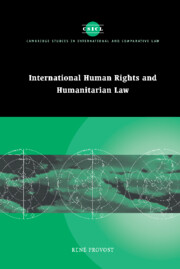Book contents
- Frontmatter
- Contents
- Acknowledgments
- Table of cases
- Table of treaties
- Table of other international instruments
- Introduction
- PART I Normative frameworks
- PART II Reciprocity
- Introduction
- 3 Formation
- 4 Application
- 5 Sanction
- Conclusion to Part II
- PART III Application: law and facts
- General conclusion
- Bibliography
- Index
- CAMBRIDGE STUDIES IN INTERNATIONAL AND COMPARATIVE LAW
4 - Application
Published online by Cambridge University Press: 07 September 2009
- Frontmatter
- Contents
- Acknowledgments
- Table of cases
- Table of treaties
- Table of other international instruments
- Introduction
- PART I Normative frameworks
- PART II Reciprocity
- Introduction
- 3 Formation
- 4 Application
- 5 Sanction
- Conclusion to Part II
- PART III Application: law and facts
- General conclusion
- Bibliography
- Index
- CAMBRIDGE STUDIES IN INTERNATIONAL AND COMPARATIVE LAW
Summary
The analysis now turns to the role played by reciprocity in the application of obligations contracted under both human rights law and humanitarian law. Its relevance is examined with respect to, first, the conditions of applicability of each system, and secondly, the suspension and termination of treaty human rights and humanitarian law norms.
Initial applicability and reciprocity
Neither human rights nor humanitarian law is grounded in the principle that the benefit of a norm should be given to a certain individual or group only in so far as that individual or group abides by the same obligation. Beyond this general pronouncement, differences arise between the two areas of law with regard to the place of reciprocity in the application of norms.
HUMAN RIGHTS
In human rights law, obligations pertaining to substantive norms are absolute or, in other words, unconditional and erga omnes. Human rights are construed liberally to apply ‘always, everywhere, and to everyone’. There are, in fact, limitations to the applicability of human rights based on, for example, nationality or membership in a minority group. These limitations, however, incorporate no element of reciprocity based on the behaviour of the benefited person or group. That the latter may lose the right to exercise some human rights fully because of the adverse effect on the rights of others is a question conceptually distinct from initial applicability of these rights to the individual or group.
- Type
- Chapter
- Information
- International Human Rights and Humanitarian Law , pp. 152 - 181Publisher: Cambridge University PressPrint publication year: 2002

